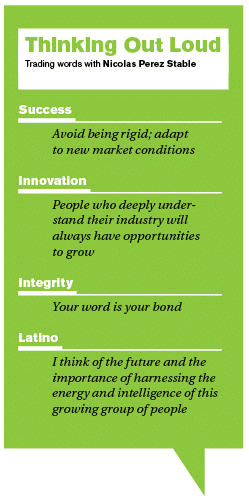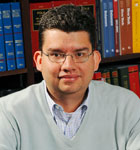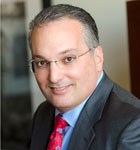 Nicolas Perez Stable’s interest in law has deep roots that preceded his successful career at GE. Back in high school, Nicolas was an avid debater and was also intrigued by international law and diplomacy. The ultimate push behind pursuing his law degree was to utilize his talent of efficiently resolving issues through thoughtful discussion and a desire to follow in his grandfather’s footsteps. “Some of the most interesting issues get debated in the boardroom or at the negotiating table. That is something that always appealed to me about the law, the negotiation and in-depth discussion of issues,” Stable says.
Nicolas Perez Stable’s interest in law has deep roots that preceded his successful career at GE. Back in high school, Nicolas was an avid debater and was also intrigued by international law and diplomacy. The ultimate push behind pursuing his law degree was to utilize his talent of efficiently resolving issues through thoughtful discussion and a desire to follow in his grandfather’s footsteps. “Some of the most interesting issues get debated in the boardroom or at the negotiating table. That is something that always appealed to me about the law, the negotiation and in-depth discussion of issues,” Stable says.
Stable, born in Miami, is the son of Cuban-Americans who came to the United States after the Castro revolution in the 1960s. From a cultural perspective, he believes that being Hispanic has made him a better negotiator. “I think we, as Hispanics, are culturally sensitive, empathetic, and skilled at connecting with people,” Stable says. “All of these skills are very important to any successful negotiation.”
Nicolas earned his law degree from New York University School of Law in 2001. His legal career began in New York City a week before 9/11 and the first professional lesson he learned was the need to be adaptable. “I started my legal career at a time when there was great flux in the law, and in the world,” he says. “Straight out of law school I expected to work on transactions in Latin America. Instead, I actually got into aviation finance by accident, through the airline restructurings that followed 9/11.”
Yet, for Stable this experience was an opportunity to be part of a great team and to learn the ins and outs of transactions from different angles. “My early experiences with restructurings made me a better transactional lawyer and negotiator in the long run,” Stable adds. “My best early-career move was to take on challenging work, wherever it may come from.”
While Stable eventually worked on multimillion-dollar financings in aviation and Latin America, his adaptability and knowledge of other aspects of the law ultimately helped him land his current position at GE five years ago.
Stable is vice president and counsel of GE Capital Aviation Services (GECAS), the commercial-aircraft financing and leasing business of GE. The company is one of the world’s leading commercial-aircraft financing companies, with a fleet of over 1,750 owned and managed aircraft with approximately 245 airlines in 75 countries. As a transactional lawyer, Stable now works primarily on new-aircraft finance transactions, although the occasional restructuring is not uncommon. Approximately a quarter of the GECAS fleet in the United States is under Stable’s watchful eye. His responsibilities are both to negotiate and implement aircraft finance transactions and to understand how public-policy issues affect GECAS, its industry, and GE as a whole.
Today, GECAS contributes more than a billion dollars of net profit to GE’s overall bottom line, partially because GECAS has consistently invested in the industry over time. “Although the aviation industry is a cyclical business, GECAS has had success by being a long-term player that tries to see around corners and adapts to changing market conditions,” Stable says. “That is something that I’ve learned working here. To be successful, you have to show a solid commitment to an industry and invest with a long-term vision.”
Nicolas is also deeply involved with the GE Hispanic Forum, a volunteer association of GE employees whose main objective is to attract, develop, and retain Hispanic talent within GE. Stable does his part by working on the group’s external-outreach initiative. “We try to build bridges and connections with Hispanic organizations and Hispanic government officials to find areas of common ground that we mutually support,” Stable adds. “Some recent successes included the 2010 Census, free-trade agreements with Colombia and Panama, and various educational and health initiatives in the Hispanic community.”
Stable also utilizes GE Six Sigma techniques to analyze issues that the legal department faces, such as rising outside counsel fees. The Six Sigma philosophy (a measurement-based strategy) teaches participants to consider the different variables within a process, isolate the key drivers, and implement a control process to create a more efficient process. “My work at GE and with Six Sigma has reinforced my belief that it is important to have a robust view of all aspects of a transaction, process, and industry in order to truly understand what is important and ultimately find lasting success.”

